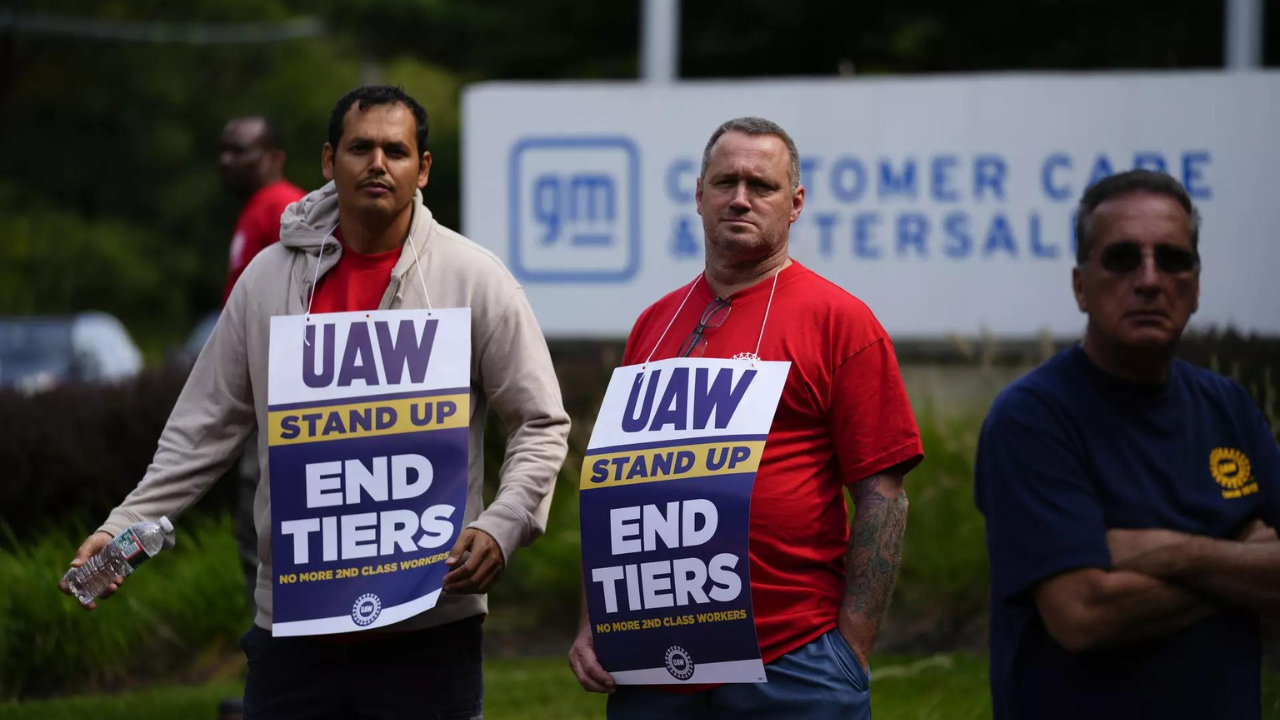General Motors raises offer to autoworkers union ahead of UAW bargaining update – Times of India

[ad_1]
In a prepared statement, GM said it made an offer Friday with “substantial movement in all key areas in an effort to reach a final agreement with the UAW and get our people back to work.”
The company says the offer raises pay for most of the work force to $40.39 per hour, or about $84,000 by the end of a four-year contract. That’s a 23% increase over the $32.32 per hour that most factory workers make. Compounded annually it’s 25%.
The company also said it reinstated cost of living raises for many employees that were given up in 2007, boosting the pay increase to over 30% by September of 2027. It previously had offered to contribute 8% of a worker’s salary into 401(k) defined contribution plans.
“It is time for us to finish this process, get our team members back to work and get on with the business of making GM the company that will win and provide great jobs in the US for our people for decades to come,” GM said in its statement.
The UAW had no immediate comment on the increased offer, but it had been seeking 36% raises over the four years. GM’s wage offer was similar to one made earlier by Ford.
The union said in a statement that Fain’s update comes after “a week of intensive negotiations” with the company.
Marick Masters, a business professor at Wayne State University in Detroit, said the GM offer has the potential to be a breakthrough that could bring agreements to end the union’s 5-week-old strikes against GM, Ford and Jeep maker Stellantis.
“That moves them closer, and I think that it may not take much from that point” to reach a deal, he said.
Fain is scheduled to do a live video appearance Friday afternoon to update workers on the bargaining. He could call on more workers to strike and join the 34,000 already off the job at six vehicle assembly plants and 38 parts distribution warehouses.
Fain will add more plants to the strikes depending on how much progress each company has made, Masters said. But he expects that GM will be spared this round due to its latest offer.
Masters said in order to settle with all three, Ford and Stellantis will have to join GM in agreeing to include future electric vehicle battery factories in the UAW national agreement. That would essentially ensure that the factories of the future would be represented by the union, a key point for the union.
Last week, before GM agreed to the battery plant provisions, the union had threatened to close a GM factory in Arlington, Texas, which makes highly profitable large SUVs.
The union’s strikes at targeted plants at each company began on Sept. 15 and are nearing the start of their sixth week.
GM was to meet with the union on Friday. There also were meetings on Thursday with Jeep maker Stellantis.
On Thursday, GM posted a video indicating that bargainers are still some distance apart. “You might might be asking yourselves why can’t General Motors meet every demand Shawn Fain is asking for?” Manufacturing chief Gerald Johnson said on the video. “Simple answer is we need profits to invest in our future.”
At the time of the video, GM’s top wage offer was $39.24 per hour by September of 2027.
The UAW also is seeking restoration of defined benefit pensions that workers gave up in the Great Recession, pension increases for retirees, an end to varying tiers of wages for workers and other items. GM’s offer appears to end the tiers in the last year of the new contract.
Johnson went on to say that during the past decade, GM had net income of $65 billion but invested $77 billion in the business. “If we don’t have those profits to continue our investments in our plants, our people and our products, we will be facing declining market share, an inability to fund the EV transition, and an inability to compete with a growing number of competitors right here in America,” Johnson said.
Ford and Stellantis have made similar comments, with Ford saying it has reached the limit on how much it can spend to settle the strike.
The union, however, says labor expenses are only about 5% of a vehicle’s costs, and the companies can divert money from profits and stock buybacks to pay for raises that cover inflation and make up for years of contracts without significant increases.
The strikes started with one assembly plant from each company after contracts expired at 11:59 p.m. Sept. 14. The union later added the parts warehouses, then one assembly plant each from Ford and GM.
Last week the union made a surprise move, escalating the strikes by adding a huge Ford pickup truck and SUV plant in Louisville, Kentucky.
About 23% of the union’s 146,000 members employed by the three automakers are on strike.
Stellantis said Friday that it canceled displays and presentations at the upcoming Specialty Equipment Market Association show and the Los Angeles Auto Show as strike costs continue to grow. Earlier this week the company pulled out of the CES gadget show in January.
